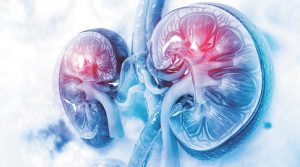By Dan P. Montzka, M.D.
 March is National Kidney Month! But what do those kidney-bean-shaped organs actually do? Not only do they filter waste products out of blood to create urine, but they also play a vital role in your body’s water regulation, maintain your blood pressure, balance your electrolytes, and produce essential hormones.
March is National Kidney Month! But what do those kidney-bean-shaped organs actually do? Not only do they filter waste products out of blood to create urine, but they also play a vital role in your body’s water regulation, maintain your blood pressure, balance your electrolytes, and produce essential hormones.
National Kidney Month brings awareness to kidney health as well as educating others about kidney disease and pertinent comorbidities. According to the Centers for Disease Control and Prevention, chronic kidney disease (CKD), commonly referred to as kidney failure, is defined as “a condition in which the kidneys are damaged and cannot filter blood as well as they should.” This ultimately leads to a buildup of harmful waste, electrolyte abnormalities, and excessive fluid retention. People who suffer from CKD can eventually develop End-Stage Renal Disease (ESRD) where the kidneys entirely cease to function. This terminal illness can only be remedied by a kidney transplant and requires lifelong hemodialysis (a process of mechanically filtering the blood).
Did you know it is estimated that 37 million Americans have CKD, and most are undiagnosed (CDC)? This may be because early stages of CKD have little to no symptoms. When CKD progresses to later stages, symptoms may include loss of appetite, swollen legs, blood in your urine (hematuria), fatigue, itchy skin, muscle cramps, shortness of breath, and changes in urinary habits. It is critical to stay on top of your health to catch declining kidney function early. Most doctors can perform routine blood tests to assess your kidney function. These tests may assess for:
. Estimated glomerular filtration rate (eGFR): a calculation of your kidneys ability to filter waste in relation to your age, gender, and race.
. Blood Urea Nitrogen (BUN): a specific waste product of protein metabolism that increases with kidney dysfunction.
. Serum Creatinine: a specific waste product derived from muscle that is used to calculate eGFR.
A urine test can also be ordered to assess abnormal amounts of protein in your urine (microalbuminuria) or hematuria.
Kidney disease can be caused by both environmental and genetic risk factors. Uncontrolled high blood pressure (hypertension) and diabetes mellitus can damage the small blood vessels of the kidney leading to abnormal filtration and water regulation. Diabetic kidney damage, medically referred to as diabetic nephropathy, can also lead to hypertension, perpetuating a cycle of further kidney damage. Other risk factors to be aware of regarding CKD include being African American and/or Hispanic, smoking, a family history of renal disease, cardiovascular disease, and age greater than 60 years.
Don’t let kidney disease sneak up on you. Prevention of CKD is extremely important, especially in those with comorbidities such as hypertension and/or diabetes mellitus. Exercise, diet, and screening for hypertension and diabetes are key aspects of CKD prevention. Stay proactive in your health by using National Kidney Month as a jumpstart to be assessing your kidney health. So, what can you do now? Remember MARCH!
Manage your blood sugar and blood pressure.
Assess your kidney function.
Remove bad habits (ex. Smoking, unhealthy foods)
Communicate about renal health.
Have healthy meals.
Retina Group Florida
If you are experiencing any changes in your eye health, whether it is blurry vision, pain, impaired vision, or any other visual irregularities, you should see an ophthalmologist right away. The earlier a disease is detected, the better the outcome and treatment options are for you. You will find a friendly and warm environment at Retina Group of Florida.
Please call (352) 419-8928 today to schedule your eye exam. When necessary same day appointments can often be accommodated.
Dan P. Montzka, M.D.
212 South Apopka Avenue
Inverness, Florida 34452
352-419-8928
retinagroupflorida.com
 Central Florida Health and Wellness Magazine Health and Wellness Articles of the Villages
Central Florida Health and Wellness Magazine Health and Wellness Articles of the Villages



